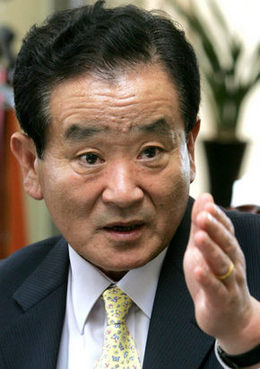 |
In regards to his recent statement that "grand arguments in favor of wealth redistribution are all just empty words," seen as a way for Kang to position himself in opposition to the Roh Moo-hyun government’s All-Inclusive Economic Growth Policy, Kang said that "[such words] were merely a digression, as reworking the system for wealth redistribution, deteriorated as it is in the wake of the 1997 financial crisis, is of greatest importance." In regards to rumors that spread in the aftermath of the May 31 local-level elections saying that, with the center of economic management shifting from the presidential office to the ruling party, he has become in effect the ’economic chief,’ Kang said this notion was "nonsense, indeed." In order to restore favorable economic conditions for the nation’s people, Kang said that this was best found "through finding employment or working independently." Thus, he proposed "revitalizing investments by large firms." He continued, "if one is to find a job, firms must invest, but investment is done mainly by large firms. Small and mid-sized companies are also linked to large companies. Self-employment is no different. Only the economy improving will lead to an increase in customers at restaurants, but if there is another way to invigorate the economy while bypassing large industries, then let me hear it." On the topic of the government’s policy, he said "it is not a policy of constraining large firms and nurturing small ones," rather, that "the investments of large firms have something to do with the growth of small and mid-sized businesses." He also repeated his conviction that resolution of the problem of wealth polarization would naturally follow from the revitalization of investments by large firms. Chairman Kang, as if in recognition of the criticism leveled at him that he is concerned only with growth, stated that "there is not a single politician who will deny the importance of wealth redistribution - however, if only the goal of wealth redistribution is espoused, then it will result in unnecessary criticism of the government as being overly one-sided." He indicated that there was a limit to resolving the income gap only by means of taxation and disbursements. Chairman Kang said, "The Roh administration has put much effort into using a system of redistribution, as is seen in the expansion of welfare expenditures to the lower middle class, but fundamentally they must set a goal of preventing the income gap from widening. In order to do this, they must have firms invest and generate jobs." He continued by saying that "growth and wealth redistribution are two sides of the same coin." In other words, only if appropriate growth is realized will the wealth distribution structure improve, and only if such improvement materializes will sustainable growth be possible. "The demand made by some to choose one or the other, growth or wealth redistribution, is a mere echo of ideological debates of the past," he said. Chairman Kang described abolishing limits on firms investing in their own affiliates as part of "the misunderstanding that the system in place blocks the growth of even those firms with managerial transparency and good governance." He explained, "We are trying to shift to a more advanced system of market regulation." In relation to policies regarding large conglomerates, he emphasized the importance of evenly-distrubuted structures of governance, transparent management, the establishment of fair trade practices, and the eradication of illegal inheritance from one generation to the next. Chairman Kang said that "from the latter half of this year through the first half of next year, the rate of growth may fall to the level of 4 to 4.9 percent, which the people may interpret as a slowdown." He continued, "if one considers such factors as the rise in crude oil prices that keep the Gross National Income from increasing, a 4-percent growth rate after the second half of this year is not a satisfactory level." Chairman Kang emphasized that "as there are no aftereffects from making financial investments for the purpose of carrying out already-budgeted government-sponsored enterprises, such a policy cannot be classified as ’artificial’ economic growth."






